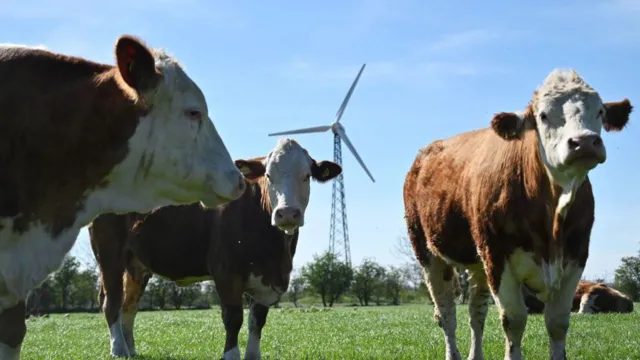
Denmark has taken a bold step toward combating climate change with the introduction of the world’s first tax on agricultural emissions, including methane emissions from livestock. This groundbreaking decision comes after months of negotiations between the Danish government, farmers, the agriculture industry, trade unions, and environmental groups. The Green Tripartite agreement, first announced in June, has now been finalized, and it promises to reshape Denmark’s agricultural sector in the coming years.
Starting in 2030, farmers will be required to pay a levy of 300 kroner ($43; £34) per tonne of methane emissions from livestock such as cows and pigs. This tax will increase to 750 kroner per tonne by 2035. The decision reflects Denmark’s commitment to achieving its climate goals, with officials stressing the importance of transforming the country’s agricultural landscape in order to reduce its environmental impact.
Jeppe Bruus, the Minister for the Green Tripartite agreement, emphasized the scope of the challenge ahead. He pointed out that transforming large areas of agricultural land into forests and natural habitats is a “huge, huge task” but one that Denmark must undertake to meet its climate objectives. Bruus noted that this effort would also include restoring Denmark’s coasts and fjords, which have been negatively impacted by nitrogen pollution.
The Green Tripartite deal between the Danish government, agriculture industry, and environmental organizations also includes provisions to tackle nitrogen pollution, a major contributor to the degradation of the country’s coastal ecosystems. The agreement aims to reduce nitrogen emissions by 13,780 tonnes annually starting in 2027, according to reports from AFP. This reduction is seen as a crucial step in restoring Denmark’s coastal waters and protecting its biodiversity.
In addition to combating pollution, Denmark’s ambitious plan also includes reforestation and habitat restoration efforts. Under the new agreement, the country will plant 250,000 hectares of new forests and restore 140,000 hectares of peatlands, which are currently used for agriculture. Peatlands are vital carbon sinks that help mitigate climate change, and their restoration is seen as an essential part of Denmark’s broader environmental strategy.
Denmark’s land use is already highly cultivated, with about 60% of the country’s territory dedicated to agriculture. This makes Denmark one of the countries with the highest percentage of cultivated land, along with Bangladesh. Given the heavy reliance on agriculture, the introduction of the emissions levy is expected to significantly impact the farming sector and shift how land is used.
The scope of these changes is vast. According to Bruus, Denmark’s natural landscape will undergo a transformation not seen since the draining of wetlands in 1864. This shift in land use is part of a broader effort to protect Denmark’s environment and reduce its carbon footprint, in line with international climate goals.
Lars Aagaard, Denmark’s Minister for Climate, Energy, and Utilities, praised the agreement as a testament to Denmark’s willingness to take meaningful action on climate change. He emphasized the importance of political cooperation and sectoral involvement, noting that the broad political majority in the Danish parliament and the active participation of affected industries and environmental stakeholders were key to the deal’s success. Aagaard suggested that the collaboration demonstrated in Denmark could serve as a model for other countries, encouraging global cooperation in the fight against climate change.
The new emissions tax, while groundbreaking, is just one part of a broader effort to shift Denmark’s agricultural and environmental practices. The Green Tripartite agreement represents a compromise between multiple sectors, acknowledging the economic realities of agriculture while pushing for substantial environmental change. Farmers, who will be most directly affected by the tax, will likely face challenges in adapting to the new requirements. However, the government has emphasized that the long-term benefits, including cleaner air, restored ecosystems, and a more sustainable agricultural model, will outweigh the short-term adjustments.
This tax on livestock emissions, particularly methane, has garnered attention internationally. Methane, which is released in large quantities by ruminant animals like cows, is a potent greenhouse gas, making it a target for environmental policies aimed at curbing global warming. Denmark’s decision to tax methane emissions sets a precedent for other countries that are grappling with the challenge of reducing agricultural emissions.
In conclusion, Denmark’s introduction of a tax on agricultural emissions, including livestock flatulence, marks a historic moment in the country’s fight against climate change. By reducing pollution, restoring ecosystems, and transforming agricultural land use, Denmark is aiming to meet its ambitious climate goals while maintaining broad political and sectoral support. The success of this agreement could inspire other nations to adopt similar measures, offering a potential blueprint for global cooperation in the climate crisis.








